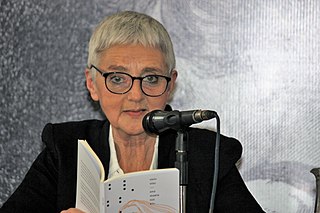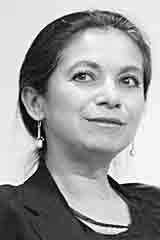
Luisa Valenzuela Levinson is a post-'Boom' novelist and short story writer. Her writing is characterized by an experimental style which questions hierarchical social structures from a feminist perspective.
Antonio Alatorre Vergara was a Mexican writer, philologist and translator, famous due to his influential academic essays about Spanish literature, and because of his book Los 1001 años de la lengua española.

Homero Aridjis is a Mexican poet, novelist, environmental activist, journalist, former ambassador and ex-president of PEN International, known for his rich imagination, poetry of lyrical beauty, and ethical independence.

Elsa Cross, is a contemporary Spanish-language Mexican writer perhaps best known for her poetry. She has also published translations, philosophical essays and is known as an authority on Indian philosophy.
Sergio Pitol Deméneghi was a Mexican writer, translator and diplomat. In 2005, he received the Cervantes Prize, the most prestigious literary award in the Spanish-speaking world.
Gloria Guardia was a Panamanian novelist, essayist and journalist whose works received recognition in Latin America, Europe, Australia and Japan. She was a Fellow at the Panamanian Academy of Letters and Associate Fellow at the Spanish Royal Academy, the Colombian and the Nicaraguan Academy of Letters

Juan Gelman was an Argentine poet. He published more than twenty books of poetry between 1956 and his death in early 2014. He was a naturalized citizen of Mexico, country where he arrived as a political exile of the Military Junta.
Antonio Martínez Sarrión was a Spanish poet and translator.

Arturo Carrera is an Argentine poet.

Ignacio Solares Bernal was a Mexican novelist, editor and playwright, whose novel La invasión was a bestseller in Mexico and Spain. Until 2005 he served as the Coordinator of Cultural Activities for Literature and Arts at the National Autonomous University of Mexico (UNAM); he was a faculty member there and directed the cultural magazine Revista de la Universidad de México. He formerly served as director of the Department of Theater and Dance and the Division of Literature at UNAM. He also edited the cultural supplement to the weekly magazine Siempre!.

Alberto Blanco is a Mexican poet. Born in Mexico City, he spent his childhood and adolescence in that city, and he studied chemistry at the Universidad Iberoamericana and philosophy at the Universidad Nacional Autónoma de México. For two years, he pursued a master's degree in Asian Studies, specializing in China, at El Colegio de México.1 Blanco was first published in a journal in 1970. He was co-editor and designer of the poetry journal El Zaguan (1975–1977), and a grant recipient of the Centro Mexicano de Escritores, el Instituto Nacional de Bellas Artes, and the Fondo Nacional para la Cultura y las Artes. In 1991 he received a grant from the Fulbright Program as a poet-in-residence at the University of California, Irvine; and, in 1992, he was awarded a grant from the Rockefeller Foundation. He was admitted into the Sistema Nacional de Creadores in 1994, for which he has also been a juror. In 2001 he received the Octavio Paz Grant for Poetry, and in 2008, he was awarded a grant from the Guggenheim Foundation. He remains a member of the Sistema Nacional de Creadores.

Andrés Neuman is a Spanish-Argentine writer, poet, translator, columnist and blogger.
Claudio Lomnitz is the Campbell Family Professor and Chair of the Anthropology Department at Columbia University. Prior to teaching at Columbia, Lomnitz was a Distinguished University Professor of Anthropology and Chair of the Committee on Historical Studies at the New School University. He served at different points in time as co-director of the University of Chicago's Mexican Studies Program, Director of the University of Chicago's Latin American Studies Program, and Director of Columbia University's Center for the Study of Ethnicity and Race. He has also taught at University of Chicago, where he was Professor of History, New York University, El Colegio de México, and Universidad Autónoma Metropolitana Iztapalapa, in Mexico City. At the New School University, Lomnitz served as editor of the academic journal Public Culture between 2006-2011. He also co-edited, with Fernando Escalante Gonzalbo, the collection "Umbrales" in Mexico's Fondo de Cultura Económica. In 2020 he was elected member of Mexico's El Colegio Nacional (Mexico).

Juan Arnau, Spanish philosopher and essayist, a specialist in Eastern philosophies and religions.

Benjamín Prado is a Spanish novelist, essayist and poet.
Antonio Colinas Lobato is a Spanish writer and intellectual who was born in La Bañeza, León, Spain on January 30, 1946. He has published a variety of works, but is considered to be above all a poet. He won Spain's National Prize for Literature in 1982, among several other honors and awards.

Aline Pettersson is a Mexican novelist and poet. Her novels deal with the themes of loneliness, heartbreak, isolation and the passage of time that razes all.

Ana María del Río is a Chilean literature professor, feminist writer, and novelist. Her honors include the Santiago Municipal Literature Award and the María Luisa Bombal Award.
Aurora Luque Ortiz is a Spanish poet, translator, teacher, and writer based in Andalusia.
Ada Salas or AdaMc is a Spanish poet and author. She has worked as a teacher. Her poetry is known for its inclusion of pauses.












